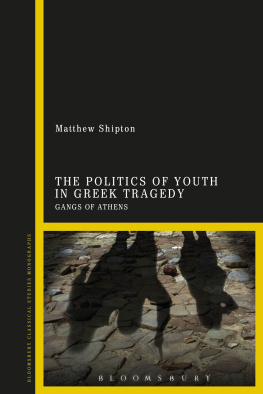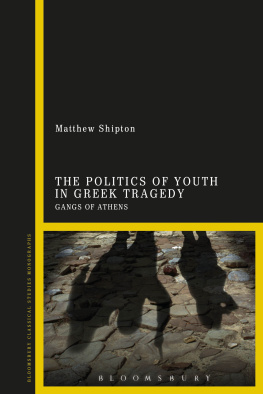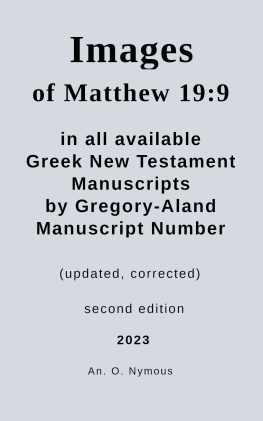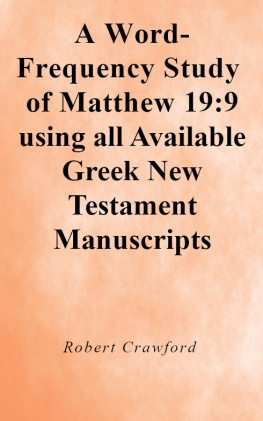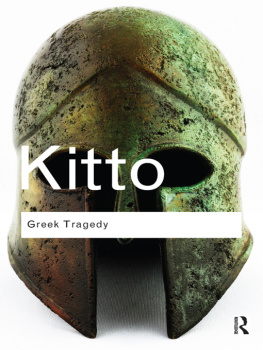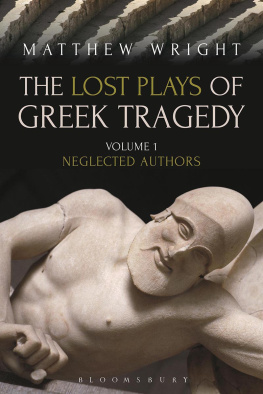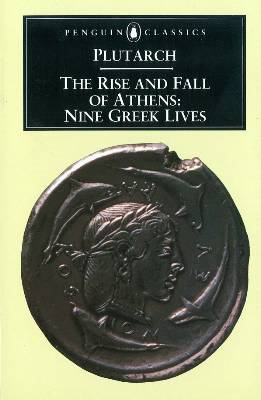Matthew Shipton - <<The>> politics of youth in Greek tragedy gangs of Athens
Here you can read online Matthew Shipton - <<The>> politics of youth in Greek tragedy gangs of Athens full text of the book (entire story) in english for free. Download pdf and epub, get meaning, cover and reviews about this ebook. year: 2018, genre: Romance novel. Description of the work, (preface) as well as reviews are available. Best literature library LitArk.com created for fans of good reading and offers a wide selection of genres:
Romance novel
Science fiction
Adventure
Detective
Science
History
Home and family
Prose
Art
Politics
Computer
Non-fiction
Religion
Business
Children
Humor
Choose a favorite category and find really read worthwhile books. Enjoy immersion in the world of imagination, feel the emotions of the characters or learn something new for yourself, make an fascinating discovery.
- Book:<
> politics of youth in Greek tragedy gangs of Athens - Author:
- Genre:
- Year:2018
- Rating:4 / 5
- Favourites:Add to favourites
- Your mark:
- 80
- 1
- 2
- 3
- 4
- 5
<> politics of youth in Greek tragedy gangs of Athens: summary, description and annotation
We offer to read an annotation, description, summary or preface (depends on what the author of the book "<
<> politics of youth in Greek tragedy gangs of Athens — read online for free the complete book (whole text) full work
Below is the text of the book, divided by pages. System saving the place of the last page read, allows you to conveniently read the book "<
Font size:
Interval:
Bookmark:

in Greek Tragedy
Also published by Bloomsbury
Becoming Female: The Male Body in Greek Tragedy, Katrina Cawthorn
Greek Tragedy: Themes and Contexts, Laura Swift
The Lost Plays of Greek Tragedy (Volume 1), Matthew Wright
Surviving Greek Tragedy, Robert Garland

This book is about the relationships between generations, how these are expressed in literature and what that might reveal about society. But the process of writing can also be considered a partial narration of ones own generational background. The choice of subject matter, theoretical and methodological approach, writing style and argument are all intimately responsive to ones individual, social and familial circumstances. As I hope to show, these choices and their contexts are not fixed but can change over time. It is yet unknown how a future self might look back at a book that emerged from doctoral study and from a period in which I began a family of my own. What will remain steadfast is a feeling of gratitude for all those who have helped bring this work to publication. With the usual acknowledgement of personal liability for any inaccuracies I must express particular thanks to the following people for various forms of help: Richard Alston, Sarah Butler, Donald Campbell, Timo Hebditch, Justine McConnell, Sheila Munton, James Robson, Henry Stead, Phiroze Vasunia, Alice Wright, staff at the Archive of Performances of Greek and Roman Drama at the University of Oxford and an unnamed editor at The London Review of Books. I give separate, specific and boundless thanks to Edith Hall, who supervised my PhD thesis and to whom I owe my full education. The number of my own genealogy to whom I am most grateful for their unfailing practical and emotional support are my mother, Geraldine Shipton and my wife, Lenka Shipton. But quite rightly this book is dedicated to the next generation, in the form of my children: Hugo and Lyra.
Matthew Shipton
The most cursory survey of the plays of Aeschylus, Sophocles and Euripides offers the reader a dizzying variety of themes and plotlines relating to youth: the townsfolk condemning a young brother and sister to death, the murder of a mother by her son (and vice versa), a grandfather abused by his crazed grandson or a young woman either actually subjected to, or only just saved from, calculated execution by her father. So dominantly has conflict between generations featured in Greek tragedy that hardly a play exists that does not include the strained relationships between young and old. From the Persian Queens condemnation of Xerxes immaturity in Aeschylus Persae of 472 through to Oedipus final denunciation of his son, Polynices, in Oedipus at Colonus of 401, the relative positioning the polarization of young and old as opposites extended throughout the golden age of Greek tragic theatre. This opposition breaks out into unequivocal violence in plays such as Prometheus or Bacchae, and even in those dramas, such as Helen, that are generally regarded as less negatively charged, the opposition between generations appears as an important theme. And yet, this opposition is not always straightforward. Characters such as Antigone, Haemon and Neoptolemus all face manipulation or downright hostility from older men and their responses can be considered in a positive light, regardless of what other flaws may have been authored into their dramatic presentation.
So what underlying influences in this golden age of tragedy helped shape such a startling diversity of characterizations? This book argues that the influences were in part political and sets out to examine the extent and the precise nature by which youth and intergenerational relationships in Greek tragedy were shaped by social constructions of these concepts. In some ways, this is not virgin territory. Indeed, almost all major citizen audience, and they will have related it to issues in their empirically discernible reality of life in Greeces pre-eminent polis. Thus this investigation focuses on sources from, and society in, Athens, and does so unapologetically.
Such a specific geo-cultural focus is justified because the high point of ancient Greek culture, the fifth century BCE, offered an astonishingly direct cultural transmission of the tensions within society, via the dramatic medium of tragedy, to a large-scale audience. For its time, this process was comparable to modern popular media in supporting a dynamic link between society and culture, and so offered evidence for the popular social constructions of the period. Quite simply, until the emergence of early modern theatre in sixteenth-century England, no art-form ever again emerged in such perfect synergy with its method of production and transmission that would allow social and political consciousness to be created, framed and communicated via drama to a large part of the community (in Western European culture at least). Just as importantly, the direct democracy of the period I have chosen to explore, and the various revolutions and counter-revolutions of the last decade of the fifth century, would have meant that the audience of productions of Greek tragedy, accustomed to witnessing overtly political performances in a public arena, would have their own lives discernibly impacted by the real-world equivalent of the issues explored in theatre. What this would have meant is that the ancient audience would have been well equipped to compare political content in Greek tragedy with their contemporary context, all the while being aware of the consequences of political decision-making.
Youth as a category of historical study, and as a thematic focus in various classical works, is fairly well embedded as part of the history of classical scholarship. Where such works fail to deepen our understanding, and where this book intends to focus, is in exploring the sheer diversity of representations of youth in tragedy, over time and alongside known political factors. The widest range of political and social settings is available for discussion, as provided by the diversity of actions and scenarios dramatized in the fifth-century Attic tragic plays, as well as an incredibly varied political backdrop. This allows the assessment of a variety of presentations (through drama or other literature) of young people whilst acknowledging the changing nature of tragedy within its historical-cultural context, thus unlocking concomitant reflections on the relationships between generic, political and social
At this very early point, the thorny issue of definition of terms must be addressed, particularly in relation to the English word youth. This word seems to be politically charged in contemporary society with solely negative associations (the terms teenagers, young people or adolescents dont seem to share this burden), but these modern negative associations are useful when using the term to refer to themes within tragedy, because these plays almost always have an antagonistic dimension. Just as importantly, the term encompasses the full spectrum of both those who may be almost part of adult society, but are not yet enfranchised, as well as those who are younger but intellectually mature enough to have begun to embrace a recognizable group identity, one which is separate from those associated with adults or children. This corresponds well with the use of the term in sociological contexts for a group that can include a range from very young teenagers to those who are in their twenties, but have not reached a point of separation from the group identity of their (younger) peers. More technically, the term youth in sociology is also one that is considered to encompass a societys web of references of attitudes towards a group in transition that is, as occupying some sort of liminal conceptual space rather than as a group defined in biological or developmental terms.
Next pageFont size:
Interval:
Bookmark:
Similar books «<> politics of youth in Greek tragedy gangs of Athens»
Look at similar books to <
Discussion, reviews of the book <

